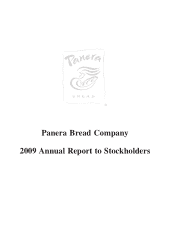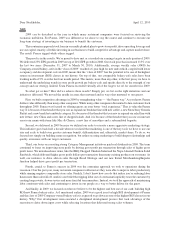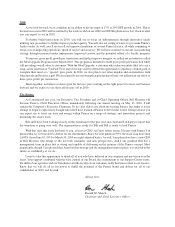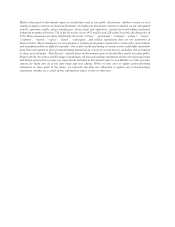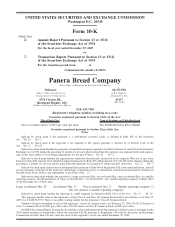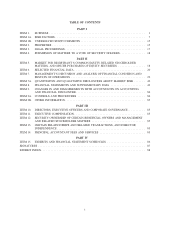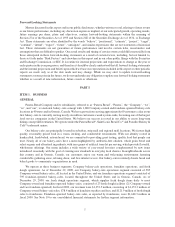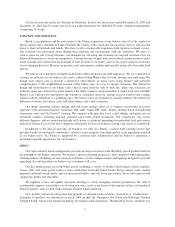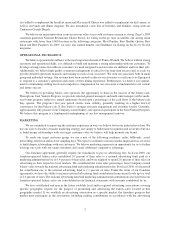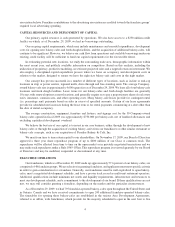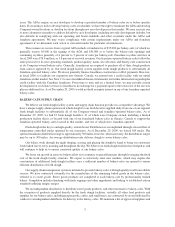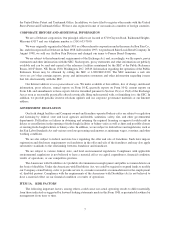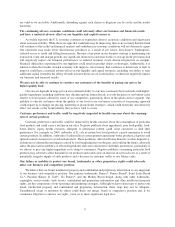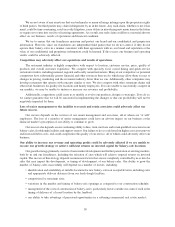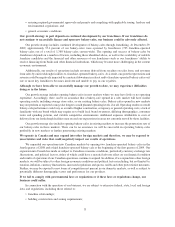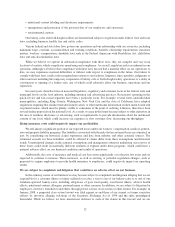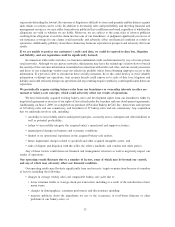Panera Bread 2009 Annual Report Download - page 11
Download and view the complete annual report
Please find page 11 of the 2009 Panera Bread annual report below. You can navigate through the pages in the report by either clicking on the pages listed below, or by using the keyword search tool below to find specific information within the annual report.years. The ADAs require an area developer to develop a specified number of bakery-cafes on or before specific
dates. If a franchisee fails to develop bakery-cafes on schedule, we have the right to terminate the ADA and develop
Company-owned locations or develop locations through new area developers in that market. We may exercise one
or more alternative remedies to address defaults by area developers, including not only development defaults, but
also defaults in complying with our operating and brand standards and other covenants under the ADAs and
franchise agreements. We may waive compliance with certain requirements under our ADAs and franchise
agreements if we determine such action is warranted under the particular circumstances.
The revenues we receive from a typical ADA include a franchise fee of $35,000 per bakery-cafe (of which we
generally receive $5,000 at the signing of the ADA and $30,000 at or before the bakery-cafe opening) and
continuing royalties generally of 4 percent to 5 percent of sales per bakery-cafe. Franchise royalties and fees in
fiscal 2009 were $78.4 million, or 5.8 percent of our total revenues. Our franchise-operated bakery-cafes follow the
same protocol for in-store operating standards, product quality, menu, site selection, and bakery-cafe construction
as do Company-owned bakery-cafes. Generally, franchisees are required to purchase all of their dough products
from sources approved by us. Our fresh dough facility system supplies fresh dough products to substantially all
franchise-operated bakery-cafes. We do not generally finance franchisee construction or ADA payments. However,
in fiscal 2008, to facilitate our expansion into Ontario, Canada, we entered into a credit facility with our initial
franchisee in that market. See Note 13 to our consolidated financial statements for further information regarding the
credit facility with the Canadian franchisee. From time to time and on a limited basis, we may provide certain
development or real estate services to franchisees in exchange for a payment equal to the total costs of the services
plus an additional fee. As of December 29, 2009, we did not hold an equity interest in any of our franchise-operated
bakery-cafes.
BAKERY-CAFE SUPPLY CHAIN
We believe our fresh dough facility system and supply chain function provide us a competitive advantage. We
have a unique supply-chain operation in which dough for our fresh bread is supplied daily from one of our regional
fresh dough facilities to substantially all of our Company-owned and franchise-operated bakery-cafes. As of
December 29, 2009, we had 23 fresh dough facilities, 21 of which were Company-owned, including a limited
production facility that is co-located with one of our franchised bakery-cafes in Ontario, Canada to support the
franchise-operated bakery-cafes located in that market, and two of which were franchise-operated.
Fresh dough is the key to our high-quality, artisan bread. Distribution is accomplished through a leased fleet of
temperature controlled trucks operated by our associates. As of December 29, 2009, we leased 184 trucks. The
optimal maximum distribution range is approximately 300 miles; however, when necessary, the distribution ranges
may be up to 500 miles. An average distribution route delivers dough to seven bakery-cafes.
Our bakers work through the night shaping, scoring and glazing the dough by hand to bring our customers
fresh-baked loaves every morning and throughout the day. We believe our fresh dough facilities have helped us and
will continue to help us to ensure consistent quality at our bakery-cafes.
We focus our growth in areas we believe allow us to continue to gain efficiencies through leveraging the fixed
cost of the fresh dough facility structure. We expect to selectively enter new markets, which may require the
construction of additional fresh dough facilities once a sufficient number of bakery-cafes are opened to ensure
efficient distribution of fresh dough.
Our supply chain management system is intended to provide bakery-cafes with high quality food from reliable
sources. We have contracted externally for the manufacture of the remaining baked goods in the bakery-cafes,
referred to as sweet goods. Sweet goods products are completed at each bakery-cafe by professionally trained
bakers. Completion includes finishing with fresh toppings and other ingredients and baking to established artisan
standards utilizing unique recipes.
We use independent distributors to distribute sweet goods products, and other materials to bakery-cafes. With
the exception of products supplied directly by the fresh dough facilities, virtually all other food products and
supplies for our bakery-cafes, including paper goods, coffee, and smallwares, are contracted by us and delivered by
vendors to an independent distributor for delivery to the bakery-cafes. We maintain a list of approved suppliers and
5

